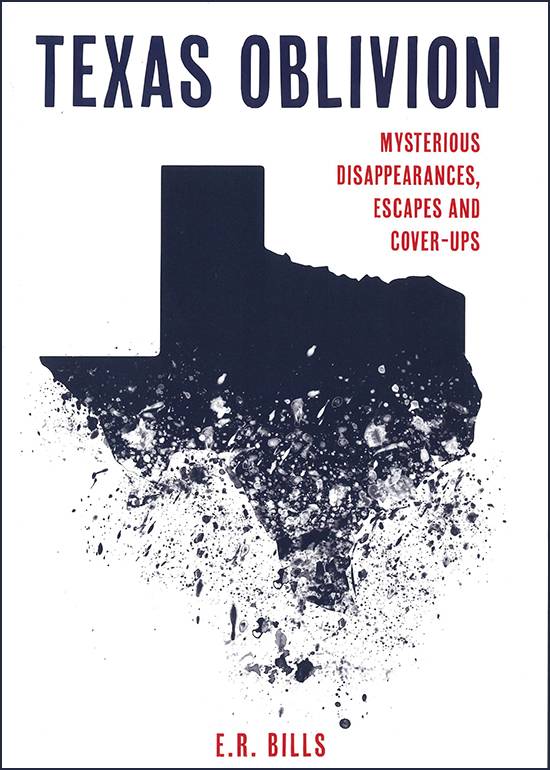A Voice for the Forgotten

Texas Oblivion: Mysterious Disappearances, Escapes and Cover-Ups
by E. R. Bills
Charleston: The History Press, 2021.
176 pp. $21.99 paperback.
Reviewed by
Aaron Hand
For nearly a decade E. R. Bills has written about the mysterious and macabre side of Texas. Some of his previous titles include Texas Obscurities: Stories of the Peculiar, Exceptional, and Nefarious and Texas Far & Wide: The Tornado With Eyes. Now his latest book, Texas Oblivion: Mysterious Disappearances, Escapes, and Cover-ups, is a perfect addition to any true-crime buff’s library.
In Texas Oblivion, Bills highlights twenty cases where Texans have vanished. He focuses on stories that have not yet been featured on television shows or gained internet fame. From a twenty-two-month-old boy who went out to play in his backyard and was never seen again, to a tanker boat, called the SS Marine Sulphur Queen, which departed from Beaumont, Texas, but disappeared near the Bermuda Triangle, Bills’s stories run the gamut of missing persons cases.
Bills shares fascinating stories that leave the reader wanting to become an armchair detective. One such story is that of a father and son, John and Luther Blanton, who “were swallowed by the Walled Kingdom” in San Perlita, Texas. The duo snuck into the Walled Kingdom (aka the King Ranch) at the heart of the Great Depression to hunt ducks for dinner and instead found their date with oblivion. According to Bills, “the King Ranch operated by its own set of rules, and the folks who lived outside of it—including government officials—were basically treated like hirelings or peons.” This dust devil of a story swirls with conspiracy and speculation about police payoffs, FBI cover-ups, and folks banding together to take on a capitalist enterprise.
The most alluring section in the book is one titled “Forgotten Massacre Victims,” in which Bills sheds light on the Slocum Massacre of 1910. Here, he writes about how Slocum, Texas, was a prosperous place for Black people during Reconstruction. He states that “some Black people who had been born into slavery had established footholds in the local economy,” including owning property as well as owning stores and businesses. This seemingly peaceful integrated town was changed forever on July 29th when “white hysteria transmogrified into bloodshed.” With unprecedented rumors spreading among the white community that the Black residents were planning an uprising, “white mobs marched through [Slocum] gunning down unarmed Black folks at will.” Bills really lets his voice ring in this section when he proclaims that “the Lone Star State, to date, has not mustered the sense of justice, moral courage, or political will to officially investigate the Slocum Massacre.” With nothing more than a historical marker on the side of the highway to acknowledge this grave injustice, Bills’s coverage of the hundreds of lost lives will hopefully break a century of silence.
While Bills does an excellent job providing stimulating stories in Texas Oblivion, with a quarter of the stories being about missing white women, the book falls into a Missing White Girl Syndrome trap. The term, coined by PBS NewsHour correspondent Gwen Ifill, refers to the media’s excessive fascination with covering missing and endangered persons cases involving white women. If Bills looks to give a voice to forgotten missing person stories in Texas Oblivion, I wish he had brought to light to more stories that no one else would, like his coverage of those lives lost at the Slocum Massacre. In a book that focuses on cases in a state as large as Texas, surely there is room for Bills to break this trope and help shed light on cold cases of missing women of color as well.
True crime journalism can draw out witnesses, lead to new clues, and jump start dead investigations. The research that Michelle McNamara did for I’ll Be Gone In The Dark led investigators to arrest The Golden State Killer. Thanks to Payne Lindsey’s tireless work hunting new leads in the disappearance of Tara Ginstead, his podcast Up and Vanished lead to (spoiler alert) her body being found and her killers being apprehended. Texas Oblivion works well for anyone looking to start a podcast on Texas true crime or someone needing to satisfy their true crime sweet tooth.
Aaron Tyler Hand is a poet currently at the Texas State University MFA program. His poems can be found in the San Antonio Express-News, Houston Chronicle, among others, and his reviews can be found in the Porter House Review. In addition to his own creative writing pursuits, Aaron volunteers his time to the prison teaching non-profit Down South Word of Mouth.
